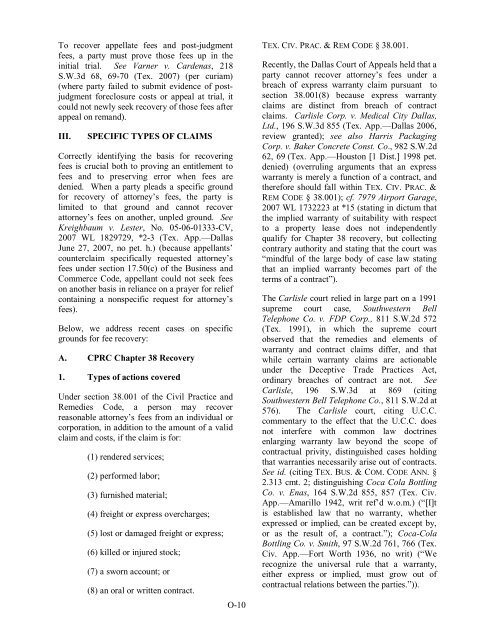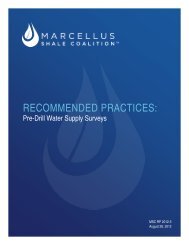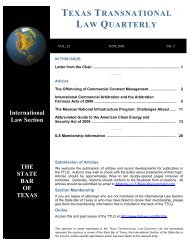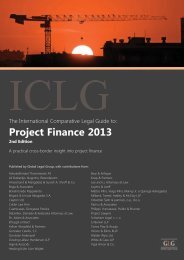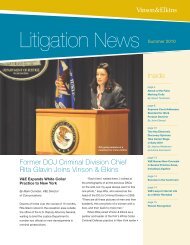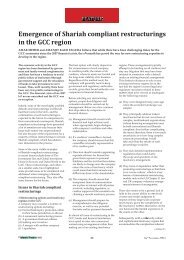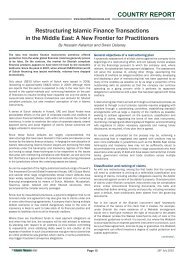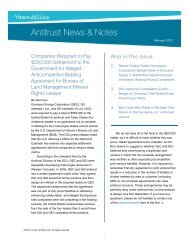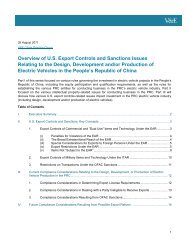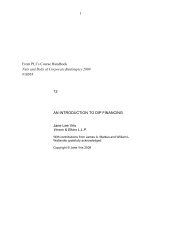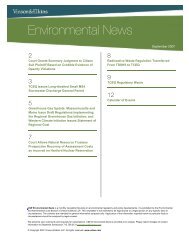Attorney's Fees Update - Vinson & Elkins LLP
Attorney's Fees Update - Vinson & Elkins LLP
Attorney's Fees Update - Vinson & Elkins LLP
Create successful ePaper yourself
Turn your PDF publications into a flip-book with our unique Google optimized e-Paper software.
To recover appellate fees and post-judgment<br />
fees, a party must prove those fees up in the<br />
initial trial. See Varner v. Cardenas, 218<br />
S.W.3d 68, 69-70 (Tex. 2007) (per curiam)<br />
(where party failed to submit evidence of postjudgment<br />
foreclosure costs or appeal at trial, it<br />
could not newly seek recovery of those fees after<br />
appeal on remand).<br />
III.<br />
SPECIFIC TYPES OF CLAIMS<br />
Correctly identifying the basis for recovering<br />
fees is crucial both to proving an entitlement to<br />
fees and to preserving error when fees are<br />
denied. When a party pleads a specific ground<br />
for recovery of attorney’s fees, the party is<br />
limited to that ground and cannot recover<br />
attorney’s fees on another, unpled ground. See<br />
Kreighbaum v. Lester, No. 05-06-01333-CV,<br />
2007 WL 1829729, *2-3 (Tex. App.—Dallas<br />
June 27, 2007, no pet. h.) (because appellants’<br />
counterclaim specifically requested attorney’s<br />
fees under section 17.50(c) of the Business and<br />
Commerce Code, appellant could not seek fees<br />
on another basis in reliance on a prayer for relief<br />
containing a nonspecific request for attorney’s<br />
fees).<br />
Below, we address recent cases on specific<br />
grounds for fee recovery:<br />
A. CPRC Chapter 38 Recovery<br />
1. Types of actions covered<br />
Under section 38.001 of the Civil Practice and<br />
Remedies Code, a person may recover<br />
reasonable attorney’s fees from an individual or<br />
corporation, in addition to the amount of a valid<br />
claim and costs, if the claim is for:<br />
(1) rendered services;<br />
(2) performed labor;<br />
(3) furnished material;<br />
(4) freight or express overcharges;<br />
(5) lost or damaged freight or express;<br />
(6) killed or injured stock;<br />
(7) a sworn account; or<br />
(8) an oral or written contract.<br />
O-10<br />
TEX. CIV. PRAC. & REM CODE § 38.001.<br />
Recently, the Dallas Court of Appeals held that a<br />
party cannot recover attorney’s fees under a<br />
breach of express warranty claim pursuant to<br />
section 38.001(8) because express warranty<br />
claims are distinct from breach of contract<br />
claims. Carlisle Corp. v. Medical City Dallas,<br />
Ltd., 196 S.W.3d 855 (Tex. App.—Dallas 2006,<br />
review granted); see also Harris Packaging<br />
Corp. v. Baker Concrete Const. Co., 982 S.W.2d<br />
62, 69 (Tex. App.—Houston [1 Dist.] 1998 pet.<br />
denied) (overruling arguments that an express<br />
warranty is merely a function of a contract, and<br />
therefore should fall within TEX. CIV. PRAC. &<br />
REM CODE § 38.001); cf. 7979 Airport Garage,<br />
2007 WL 1732223 at *15 (stating in dictum that<br />
the implied warranty of suitability with respect<br />
to a property lease does not independently<br />
qualify for Chapter 38 recovery, but collecting<br />
contrary authority and stating that the court was<br />
“mindful of the large body of case law stating<br />
that an implied warranty becomes part of the<br />
terms of a contract”).<br />
The Carlisle court relied in large part on a 1991<br />
supreme court case, Southwestern Bell<br />
Telephone Co. v. FDP Corp., 811 S.W.2d 572<br />
(Tex. 1991), in which the supreme court<br />
observed that the remedies and elements of<br />
warranty and contract claims differ, and that<br />
while certain warranty claims are actionable<br />
under the Deceptive Trade Practices Act,<br />
ordinary breaches of contract are not. See<br />
Carlisle, 196 S.W.3d at 869 (citing<br />
Southwestern Bell Telephone Co., 811 S.W.2d at<br />
576). The Carlisle court, citing U.C.C.<br />
commentary to the effect that the U.C.C. does<br />
not interfere with common law doctrines<br />
enlarging warranty law beyond the scope of<br />
contractual privity, distinguished cases holding<br />
that warranties necessarily arise out of contracts.<br />
See id. (citing TEX. BUS. & COM. CODE ANN. §<br />
2.313 cmt. 2; distinguishing Coca Cola Bottling<br />
Co. v. Enas, 164 S.W.2d 855, 857 (Tex. Civ.<br />
App.—Amarillo 1942, writ ref’d w.o.m.) (“[I]t<br />
is established law that no warranty, whether<br />
expressed or implied, can be created except by,<br />
or as the result of, a contract.”); Coca-Cola<br />
Bottling Co. v. Smith, 97 S.W.2d 761, 766 (Tex.<br />
Civ. App.—Fort Worth 1936, no writ) (“We<br />
recognize the universal rule that a warranty,<br />
either express or implied, must grow out of<br />
contractual relations between the parties.”)).


